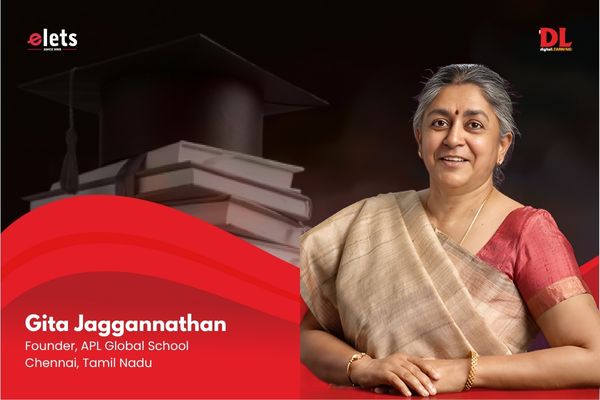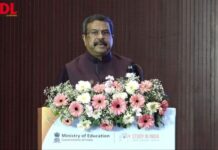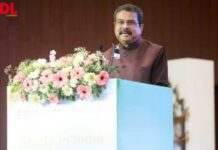
A lofty title indeed! I can neither presume to pioneer nor to innovate. What I can do, however, is act as a catalyst to transfer energy and bring our focus back to the why and what of education before we rush to the how. Perhaps, in doing so, I can help initiate a wave of introspection.
We are in a phase where EdTech is spreading its reach across the educational landscape. Before we explore the digital world and its impact on learning, let us first revisit the basics.
To my mind, the purpose of education is to connect deeply with the self, with the community, and with the world at large. It is to cultivate discernment so that we may contribute meaningfully to the creation of a just, inclusive, and peaceful world. Ultimately, education is a journey toward self-actualisation.
The connection to the self starts with seeds sown in early childhood and is a lifelong journey. At that stage play and exploration, within the simple guideline of causing no harm to oneself or others are essential. Making friends, taking turns, sharing and caring all nurture a sense of community. Spending time in nature fosters an early bond with the wider world.
As we grow and learn more about ourselves and our place in the world, we must develop the capacity to make responsible choices. Offering children choices in their learning and assessment, enhances respect for their needs, realistic self-assessment, and independent thought unclouded by peer or adult influence.
Such growth can only happen in an environment where comparison and competition are not used as motivators. These are fear-based tools that are detrimental to the goal of self-actualisation.
In bringing innovation into education, we must consider several imperatives: sustainability, change management, ethics, cultural responsiveness, equity, inclusivity, and readiness not just of the learners, but of the facilitators and the organisation as a whole. Only changes that honour all these dimensions are truly welcome.
At the heart of many global challenges today lies a loss of connection. Digital tools like search engines and social media connect us outwardly with the world, but they often weaken and hamper our ability to connect inwardly to ourselves.
EdTech has not yet evolved to address emotional intelligence (EQ). Much of digital learning is solitary pursuit, driven by instant gratification and external rewards such as badges and scores. While learners may master content, they do so in isolation. The nuances in learning through constructive feedback, a cornerstone of growth is diminished and perhaps lost in the process. As a result, intrinsic motivation, a key ingredient of a fulfilling life, is greatly impacted.
The social quotient (SQ) is also impacted. There is little space for teamwork, for listening to and valuing diverse perspectives, or for negotiating and disagreeing respectfully, all vital life skills. Yet, digital access to varied cultural content also offers an unprecedented opportunity: to cultivate cultural awareness and responsiveness, if used with intention.
Cognitively, the effects of technology are mixed. Research, still in its infancy, shows improvements in multitasking, language acquisition, and engagement. Problem-solving abilities often improve. Yet the negative impact is felt in the attention spans, memory, and executive functions. Technology also disrupts sleep, which in turn affects cognitive development.
Physical health and development are the most impacted and are most concerning. Device use is inherently sedentary in nature. In young children, it affects fine and gross motor development which are closely linked to cognitive growth. Rising obesity levels are an undeniable consequence.
Technology serves creativity well by offering vast resources and digital tools. Exposure to global art forms can empower a whole new generation of creators. Yet, with easy access to existing material, originality becomes harder to cultivate.
Similarly, the use of video in teaching, while popular for its clarity, can sometimes rob students of the chance to imagine and visualise for themselves. The skill of transferring textual or verbal information into a visual format lays a much stronger foundation to learning. I prefer to use videos later in the learning process, when students have already formed mental images. This strengthens conceptual understanding and consolidates learning.
In special education, EdTech has been transformative. Augmentative and alternative communication tools and assistive technologies have given a voice to the differently abled. Personalised learning is better served through technology, and accessibility tools have greatly enhanced participation. Public infrastructure, however, must continue to evolve to meet these needs and in this regard, Tamil Nadu’s efforts deserve recognition.
Also Read :- Bridging the Education Divide: How Tier 2 and Tier 3 Cities Are Driving India’s Primary Education Growth
AI tools, particularly ChatGPT, have sparked concern among educators. A recent MIT study, found that ChatGPT users showed lower engagement, attention, and memory compared to non-users. Initially, many likened AI tools to calculators, just another aid. Increasingly, that view seems shortsighted.
The challenge before us, then, is not whether to use AI, but how to use it wisely. How do we harness its potential without diminishing our cognitive and emotional capacities? This is the question we must address collectively as educators.
What then is the future of education in a digitised world? I feel it lies in balance. We have reached a model where technology can genuinely personalise learning. Teachers can design differentiated tasks for diverse learners, and students can choose from a bouquet of options tailored to their interests and readiness levels. Assessments, too, can be differentiated. When used with purpose, technology enriches learning while shielding students from its negative effects.
As educators, we must constantly assess the impact of every innovation and adopt each one with pragmatism, empathy, and wisdom.
Let us continue to innovate, but never at the cost of our humanity. Let us ensure that every advancement in technology also brings us closer to the essence of what it means to learn, to grow, and to be fully human.
Views expressed by Gita Jaggannathan, Founder, APL Global School, Chennai, Tamil Nadu






















